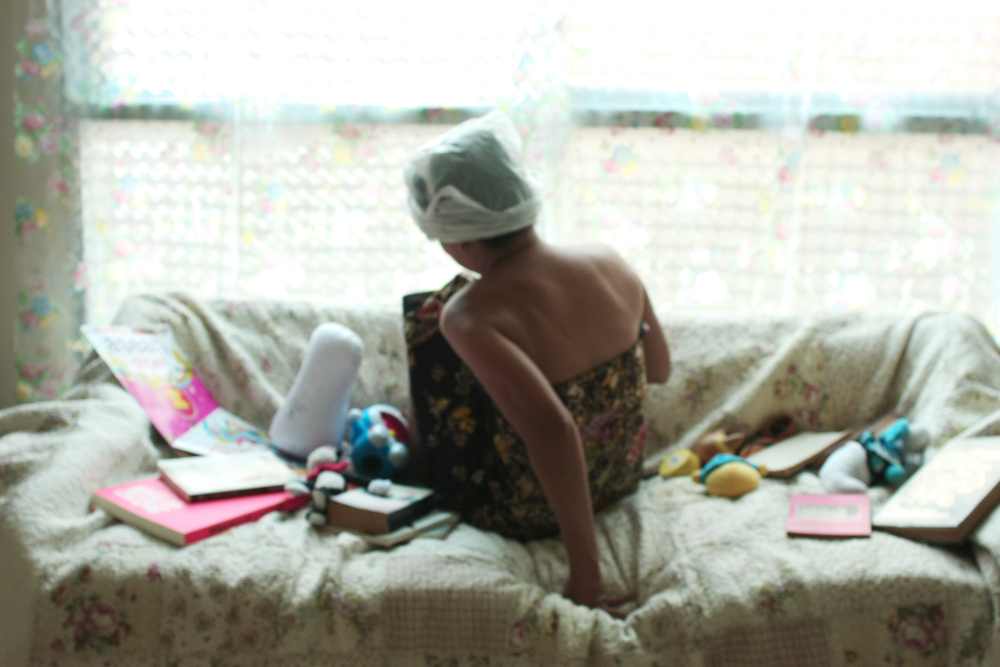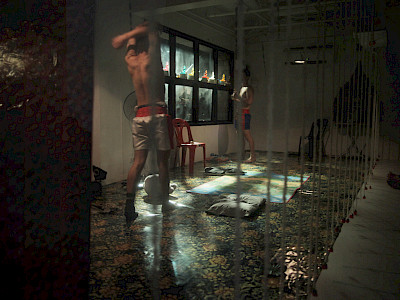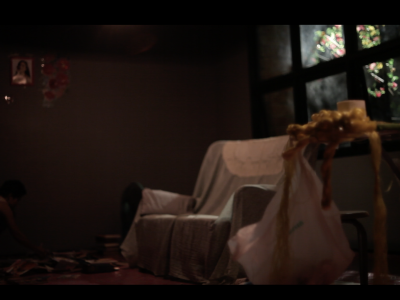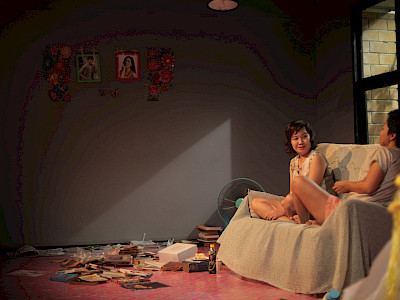27 — 30.05.2023
In front of us are two small apartments. Two women live in one; in the other, two teenage boys spend time together. In both, the same pervasive sound of Thai state radio is heard, alternating between news items, traditional music, propaganda, and advertising. Suddenly, conversations blossom in parallel. The women talk animatedly about the possible ends of their lives. On the other side, the two boys recall watching the 1993 movie Little Buddha at school, the crush they had on Keanu Reeves in that film, and how one of them became sexually excited thinking about Buddha. Wichaya Artamat is back at the festival with an irreverent take on today’s Thailand, a country where religion, the army, and the monarchy are untouchable pillars of society. After the success of This Song Father Used to Sing (2019), Artamat returns to naturalistic theatre that employs subtle acting, everyday gestures, and small details. It’s a cinematic style that places us inside two apartments in Bangkok, using satire to go beyond a simple story and express what cannot be expressed openly. With poetry, tenderness, and comedy, Baan Cult, Muang Cult (The Cult of the Home, The One of the Nation) is an unexpected exploration of Thailand’s social structure as a cult.
Coded Culture
In 2013 Wichaya Artamat put a first version of Baan Cult, Muang Cult on the table. Shortly after, the cryptic rooms of puzzlement had secured his place on the Thai theatre map ever since.
Baan Cult, Muang Cult introduced the director’s unique approach to an audience. He presented vagueness, mundanity and absurdity on the surface while Thailand’s ongoing political turmoil was subtly and satirically rendered underneath. Bits and pieces of small details were selected into the play’s visual and soundscape, so that seemingly improvised everyday gestures and random sentences could embody the zeitgeist of 2010s Thailand.
During those years after the turmoil had taken its bloodiest turn with May 2010 massacre in downtown Bangkok, ignorance and apathy became pillars on one side while fear and hopelessness looming over the other. Voices of the
opposition were actively silenced, suppressed and stigmatized by the state, mainstream media or even their fellow citizens from everyday life. Yet, concurrently, a paradigm had been shifted.
Thanks to a series of protests and consequential incidents following the 2006 military coup, political awareness had been gathering momentum with a change of direction. More people had started becoming critical of the unconditionally revered monarchy including its surrounding networks. However, these emerging voices were still marginalized and kept hidden, humming underground or within close-knitted groups, like a gossip. But uncertainty and danger remained the predominant sentiments. Baan Cult, Muang Cult was conceived under this prevailing political climate, developed from Maebaan Muang Bhud (Housewife in a Buddhist Land, 2013), another covert work-in-progress by Wichaya Artamat himself.
Maebaan Muang Bhud was adapted from Franz Xaver Kroetz’s play Wunschkonzert (1971) with a hint of homage to Chantal Akerman’s Jeanne Dielman, 23, quai du commerce, 1080 Bruxelles (1975) and directly inspired by one politically-charged Indonesian adaptation of Kroetz’s play, in which a picture of General Soeharto was installed and made visible on stage. Maebaan Muang Bhud was only shown to a selected groups of audience via four-day invitation-only event.
Instead of faithfully depicting just a woman in an hyper-realistic household, the Fräulein Rasch from Wunschkonzert became an anonymous Buddhist Land woman, and her favourite radio show Sie wünschen? became a mishmash of kitsch consisting of ads, songs, news items and everyday propaganda from Radio Thailand’s AM broadcasting. Most importantly, General Soeharto became King Bhumibol [the king of Thaïland until 2015 – ed].
Though his portraits can be seen everywhere in Thai everyday life (even dubbed and promoted as ‘household portrait’ by mainstream media), it was still unthinkable back then to intentionally stage or film any royal-related items, unless being royal propaganda. For many in this homogeneous society, a different positioning of the monarchy is unimaginable, impossible even. Several members of the audience failed to notice the King’s portrait here.
Political expression within the realm of art, aside from propaganda, were limited to abstract heavy symbols or rea-listic hidden metaphors. Politics must be coded or compressed into the everyday: authoritarianism could be dissected by a simple school story, concealed criticism of the monarchy could be made out of an ordinary father figure (especially dying or dead ones) in what seems like a typical family drama (referring to an imaginary familial bond in which the late King was worshipped as ‘Father of the Land’), a household portrait and everyday radio could overpower the interpretation of a 42-year-old German play.
Regarding what cannot be expressed openly in Thai society, beating around the bush seems the only option left. Wichaya Artamat was trying to tackle and expose this ridiculous situation when certain political expressions were discouraged so terribly that the everyday had to be political by itself.
Although just beating around, it was still justifiable and valid since intriguing more others to notice the same bush (or the elephant in the room) is already an achievement. In 2013 Baan Cult, Muang Cult beats around even harder, opening up rooms for further exploration of eloquent codes and scattered crumbs.
The unique room from the original play became two in Baan Cult, Muang Cult, one character sprouted into four (named on paper but still anonymous on stage), Radio Thailand broadcast conquered the first act, but human silence later broken by cryptic written and improvised dialogues. Originally, Bangkok audience needed two separate days to attend because both rooms were really separated, but only the actors were allowed crossing over during the simultaneous performance, and combinations of actors together with their assigned roles were kept switching almost daily.
Colourful little Buddhas, crown-flower blinds, political-themed publications, gossipy metaphors and the narrative climax involving a father figure could be considered obvious hints but still a distance away from logical comprehensibility. Everyday gestures or actions (even real-time cooking) seemed natural yet altogether screaming uncanny, either these characters were living their everyday inside a bizarre cult film or somewhat detained under an actual cult; either they are living anomalies or a society (Buddhist Land, Cult Land, Thailand) is the anomaly by itself. Baan Cult, Muang Cult was a breath of unsettling air. Resonating the real world’s lingering air of uncertainty, the play’s confined points of view kept the audience away from a coherent whole, but rather provided them disconnected and incomplete vision without any closure or resolution.
Ten years later, after hypes of hope had peaked during the 2020-2021 protests, after callings for monarchy reform had been widely endorsed, after new generation of Thais had openly rejected the royal anthem, after the standpoints concerning lèse-majesté had become a decisive factor during the upcoming general election (May 2023), the re-creation of Baan Cult, Muang Cult now should have been considered obsolete. Ironically, not yet.
Culturally, the political climate has been altered for the better. Politically, closure and resolution are still kept out of sight. The society has somehow agreed upon the elephant’s existence yet disagreeing about how to, when to, or do they even have to deal with it. Hence, the wall between both rooms became thinner, all characters having a slight awareness of the other two and their parallel conversations became intertwining.
From when nobody dared questioning King Bhumibol’s sufficiency economy to when The King Never Smiles [an unauthorized biography of Thailand’s King Bhumibol written by Paul M. Handley in 2006 – ed] became popular underground, from when an award-winning TV director received universal applause for his royalist speech calling for banishment of others to when King Vajiralongkorn’s [current king of Thaïland, the only son of King Bhumibol] ‘land of compromise’ remark became an object of ridicule, many codes are yet to be cracked in Cult Land.
- by Chayanin Tiangpitayagorn
- April 2023
- Chayanin Tiangpitayagorn (1987) works as a film and theatre critic, active since 2008. Apart from writing and translating for offline and online publications, he’s also a member of Bangkok Critics Assembly, Wildtype (a loose group of voluntary cinephiles and curators highlighting under-represented independent film and video art) and International Association of Theatre Critics (IATC) – Thailand Centre.
Presentation: Kunstenfestivaldesarts, Kaaitheater
Concept and direction: Wichaya Artamat | Text: Ratchapoom Boonbunchachoke, Pathipon Adsavamahapong | Cast: Parnrut Kritchanchai, Dujdao Vadhanapakorn, Sarut Komalittipong, Surat Kaewseekram | Radio essay: Wichaya Artamat | Technical direction and scenography: Pornpan Areeyaveerasid, Rueangrith Suntisuk | Costume design: Nicha Buranasamrit | Stage management: Pathipon Adsavamahapong
Production and tour management: Sasapin Siriwanij | Coproduction: Kunstenfestivaldesarts




